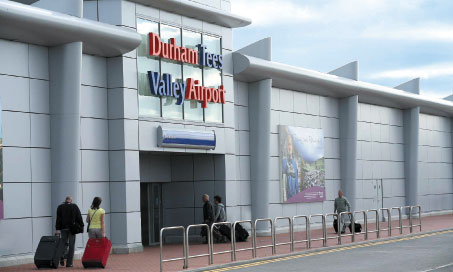
In 2004, bmibaby signed an agreement requiring it to base two aircraft at Durham Tees Valley for 10 years. However, in late 2006 the airline withdrew both aircraft and redeployed them at other UK airports, subsequently cancelling all Durham Tees Valley services without warning and without agreeing with the airport any terms for its departure. The airport company launched a claim for breach of contract against the airline, claiming damages for lost income it would have received for the remainder of the 10-year agreement.
While the airport was not awarded any damages at the UK’s High Court in March 2009, because the contract did not contain any provisions detailing how many times each aircraft had to fly each day or to which destinations, the Judge granted the airline leave to appeal. The Court of Appeal ruled that bmibaby was clearly in breach of contract in withdrawing all services only two years into a 10-year agreement and, as such, damages should be awarded to the airport company. “This is a very significant ruling for the airport. We entered into a 10-year contract for air services in good faith and invested millions into the partnership. We were hugely disappointed when the airline withdrew,” said Pakey.

Durham Tees Valley Airport won a landmark ruling in the UK Court of Appeal in May against bmibaby, relating to the airline’s withdrawal of all services from the airport in 2006. The compensation that Durham Tees Valley will now receive remains to be decided.
The main arguments surrounded the contract; the airport committed to invest heavily, while the airline committed to base aircraft at the airport. All commitments were interdependent and a true partnership was formed. “When the airline withdrew it was like a divorce, a break-up of our marriage,” commented Pakey.
The Court ruled in favour of the claimant, the airport, that the airline’s commitment to base and operate aircraft was binding and dismissed the airline’s contention that the contract was sufficiently uncertain to be legally binding. The issue here was that the contract stated that the airline must base and operate two aircraft for a 10-year period. What it didn’t do was say how often and to which destinations the aircraft should fly. The airport argued that the flying programme and frequency of flying was a matter to be determined by the airline based on its own operational model. The Court agreed with the airport in this regard.
“Most airline and airport partnerships over fixed terms that we are party to do work well. The airport needs an operational commitment from the airline as to the number of aircraft and time period it will commit to operate from that airport as a base, so that the airport can then derive some comfort from the costs it may then incur in paying for improvements to infrastructure and other facilities at that airport,” explained Pakey. “In other words, in order to invest, why should a privately owned airport take that risk without underpinning some of the risk at the outset. With the right partnership and both sides committed, then long-term airport and airline contracts are as relevant today as they were 10 years ago.”
Reflection of risk
The clear message appears to be that Courts will look to enforce the terms of a commercial contract when they can do so and that they will not support the idea of a party avoiding legal obligations on a technicality, as happened in this instance in the High Court. “The main loser in this is the north-east of England market, whose passengers and businesses are left without international links,” said Pakey. “However, the key element of the case is that a contract is a contract at the end of the day. We didn’t wish to rely on it, but it was the right framework to reflect the risk we were taking at the time the contract was entered into, to reflect our investment in the airport.”
The compensation that Durham Tees Valley will now receive remains to be decided. In the absence of reaching agreement with the airline, the matter will be referred back to the High Court to determine this level of compensation; the Court of Appeal has given guidance on the parameters for this, indicating that it should be based on the flying programme the airline would have operated had it not withdrawn all of its services.







